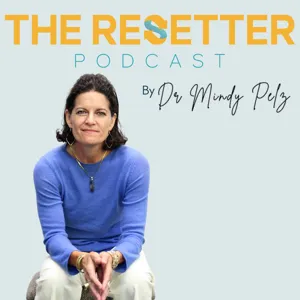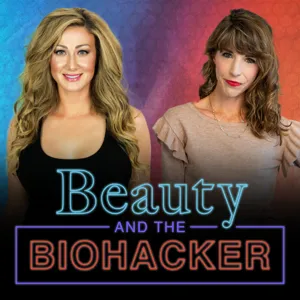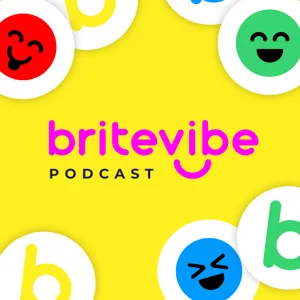Podcast Summary
Exploring the Benefits of Intermittent Fasting: Intermittent fasting is a lifestyle change involving intentional periods of fasting between meals, shown to improve health, increase energy, and enhance mood. The 16:8 method, a popular and scientifically supported approach, involves a 16-hour fast and an 8-hour eating window.
Intermittent fasting involves intentionally extending periods of fasting in between meals, which every person already does naturally during sleep. This lifestyle change can improve health, increase energy levels, and enhance mood. Over 100,000 people participated in the world's largest intermittent fasting study, and initial findings suggest health benefits. Intermittent fasting is not about depriving yourself of food, but rather altering the balance between feeding and fasting periods. There are various methods of intermittent fasting, but the most popular and scientifically supported one today is the 16:8 method, which involves a 16-hour fast and an 8-hour eating window. This approach has been shown to help people get used to fasting within 28 days and enjoy food more, not less.
Eating in Harmony with Our Circadian Rhythm: Syncing meals with our body's natural 24-hour cycle can lead to better health outcomes. Listen to your body to determine the best eating schedule for you.
Intermittent fasting, specifically time-restricted eating, is becoming a popular lifestyle choice for many people. This approach involves setting a daily eating window and fasting outside of that time. While there are different methods, such as alternate daily fasting, the daily eating window approach is the most common. The benefits of this way of eating are linked to our circadian rhythm, which is a 24-hour cycle that influences when we should eat and be active. Eating in sync with our body's natural rhythms can lead to better health outcomes. It's important to remember that bioindividuality plays a role, and we should listen to our bodies to determine what eating schedule works best for us. Additionally, eating patterns that go against our circadian rhythm, such as late-night snacking, can negatively impact our health. Overall, the key takeaway is that eating in harmony with our circadian rhythm can lead to better health outcomes.
10-hour eating window with 14 hours of overnight fasting improves energy, mood, and reduces hunger: The Big IF study found that restricting eating to a 10-hour window and fasting for 14 hours improved energy levels, mood, and decreased hunger. Consistent implementation led to reduced snacking and improved gut symptoms.
The Big IF study, a large health study in the UK, found that people who restricted their eating to a 10-hour window, with 14 hours of overnight fasting, experienced improvements in energy levels (up by 22%), mood (improved by 11%), and a decrease in hunger, despite eating in a shorter time frame than before. Those who inconsistently followed the eating pattern reported increased hunger and lower energy levels. The study also showed that those who had a larger eating window at the beginning of their day benefited the most. Additionally, participants reported reduced snacking and improvements in gut symptoms, such as a decrease in bloating by 11%. The study suggests that it's essential to find a sustainable eating pattern that suits individuals to make long-term changes. The study saw a 2/3 to 1/3 split between those who chose to eat late and those who ate early, with more people opting for late time-restricted eating.
Giving people freedom in choosing eating regimes leads to better results: Allowing individuals to find their optimal eating patterns leads to higher completion rates and potential benefits for those initially uninterested in nutrition. Fasted exercise and delayed eating windows may offer health benefits, but more research is needed.
Giving people the freedom to choose their own eating regimes, rather than forcing it upon them, leads to better results. Out of 148,000 people who signed up for a nutrition study, 37,000 completed it, and about a third of those not initially interested in nutrition were able to benefit from it. This approach allows individuals to find what works best for them, as some people naturally feel more energetic when they delay their eating window. The idea of needing to eat before engaging in physical activity is also being challenged, as research suggests that fasted exercise can be beneficial for health. However, it's important to note that while these are promising findings, more research is needed to understand the long-term implications of these lifestyle changes for a diverse population.
Study reveals time-restricted eating's surprising health benefits: Time-restricted eating can lead to reduced inflammation, improved immune function, better gut health, heightened mood, increased energy, and potential disease risk reduction
A community science study on time-restricted eating has revealed surprising results beyond weight loss and cardiovascular health. The study shows consistent reduction in inflammation, which is an activation of the immune system. This reduction in inflammation leads to improved immune system function, better gut microbes, heightened mood, increased energy, and minor changes in response to sugars and fat levels. Although it's not a silver bullet, long-term implementation of time-restricted eating can have significant effects on reducing the risk of various diseases, including aging-related diseases and cancers, as chronic inflammation is linked to these conditions. The key is to find a sustainable eating window and stick to it for the long term.
Exploring the potential benefits of time-restricted eating: Limiting hours for eating could improve health, but more research is needed, especially long-term studies. Benefits may depend on individual's starting point and frequent snacking habits.
Time-restricted eating, which involves limiting the hours during the day when you eat, shows promising potential for health benefits, although more research is needed, particularly long-term studies. The evidence comes from various sources, including mouse studies, small human trials, and larger community studies. While there's no harm for most people with a few exceptions, the exact size of the benefits remains uncertain and may depend on an individual's starting point. For those who frequently snack or eat from the moment they wake up till late at night, significant changes could occur. It's essential to view time-restricted eating as a long-term goal, and while perfection is not required, maintaining the practice most days of the week is beneficial. Occasional exceptions, like indulging in a special meal or event, are acceptable as long as they're "window worthy." Overall, the conversation emphasizes the potential benefits of time-restricted eating, but also acknowledges the need for further research to fully understand its impact.
Becoming metabolically flexible for time-restricted eating success: Success with time-restricted eating varies, becoming metabolically flexible can help, focus on nutrient-dense foods during eating window.
While some people may find success with time-restricted eating or intermittent fasting, it may not work for everyone. The individual experience can vary greatly, and what works for one person may not work for another. Some people, like the speaker, found it difficult to stick to the diet and reported feeling worse rather than better. The key to success is becoming metabolically flexible, which means being able to wake up and delay eating without feeling the need to send something down right away. This can be achieved by training your body to use the fuel that's already on hand, such as glycogen stored in the liver and muscles, and fat stored on the body. If you're someone who naturally grazes throughout the day and struggles with prolonged periods without food, it may be challenging to get started with time-restricted eating. However, it's important to remember that everyone is different, and what works for some may not work for others. If you're interested in trying time-restricted eating, it may be helpful to start by gradually extending the time between meals and focusing on nutrient-dense foods to fuel your body during the eating window.
Adjusting your eating pattern for health benefits: Intermittent fasting involves limiting eating hours, allowing the body to learn to use stored energy and potentially improve health.
Intermittent fasting involves adjusting your eating pattern to experience health benefits, such as improved metabolic flexibility and inflammation reduction. This means limiting your eating hours, like having your first meal around 11 AM and finishing by 7 PM. However, it's important to note that there's an adjustment period where your body learns to use stored energy instead of relying on recent food intake. This concept is referred to as "flipping the metabolic switch." To help navigate this process, consider starting with a plan tailored to your needs, such as the one outlined in Jin's book "28 Day Fast Start Day by Day." This resource offers guidance for various starting points, from gradual introductions to more immediate changes. Remember, the goal is to give your body a chance to become metabolically flexible, allowing it to access stored energy and potentially improve overall health.
Avoid adding flavors or sweeteners during intermittent fasting: Stick to plain beverages like black coffee, plain water, and plain tea during intermittent fasting to avoid triggering an insulin response and make the process more effective.
During intermittent fasting, it's essential to follow a strict regimen of only consuming black coffee, plain water, and plain tea during the fasting period. Even though these beverages contain no calories, adding flavors or sweeteners, even herbal teas, can trigger an insulin response due to the cephalic phase insulin response. This response occurs when the brain perceives sweetness, causing the pancreas to release insulin, making it harder for the body to enter a fasted state. Sticking to plain beverages during the fasting window helps make the process easier and more effective. Additionally, it's important to understand that even tasting sweet flavors can trigger an insulin response, as rodent studies have shown.
The insulin response to fruit can lead to a blood sugar crash: Consuming fruit triggers insulin release, potentially leading to overeating and energy crashes. Trust the process and your body will adapt to using stored fat for energy.
Our body's response to consuming fruit or sugar involves the release of insulin, even if we've had no calories. This insulin response can lead to a blood sugar crash, making us feel worse than if we hadn't consumed the fruit. The body might then think we're hungry and we could overeat during our eating window. It's important to remember that our body needs time to adjust to this new way of eating, especially if we're not metabolically flexible or fat-adapted. We might overeat initially because our body can't tap into our stored fat for energy. However, this goes away as our body learns to metabolically switch. We don't need to worry about eating enough during our eating window or starving during our fasting window. Instead, we can trust that we can get more food if we're still hungry when our window closes. Eating later into the night can actually make us hungrier earlier the next day. The transition to a clean, fasting lifestyle might take some time, but it can lead to more energy, less hunger, and potentially more healthy years. If you're interested in making smarter food choices and transforming your relationship with food, consider taking the ZOE quiz and joining the thousands of people who have already made positive changes.
Experiment with small eating habit changes for improved mood and energy: Small changes like a 10-hour eating window or caffeine elimination can enhance mood and energy within weeks. Find what's sustainable for your lifestyle and goals, focusing on a balanced approach for nourishment and weight management.
Making small changes to your eating habits, such as trying a 10-hour eating window or eliminating caffeine, can lead to noticeable improvements in mood and energy levels within a few weeks. However, finding the right eating window for your body may take some experimentation and may vary depending on individual factors like age and sex. It's important to focus on what's sustainable for your lifestyle and goals, rather than aiming for an extremely short or long eating window. The evidence suggests that there is a linear relationship between the length of your eating window and the potential health benefits, but it can also become harder for some people to maintain longer fasting periods. Ultimately, the goal is to find a balanced approach that allows you to nourish your body and maintain a healthy weight.
Considering individual lifestyle for optimal eating window: An early or late eating window can work for intermittent fasting, depending on lifestyle factors. Focus on food quality and whole food, plant-based approach for optimal health.
While the concept of a 10-hour eating window can be beneficial for some, it's important to consider what works best for an individual's lifestyle. The theory of an early eating window may be more sustainable for some, while others may find a late eating window easier due to social or cultural factors. Additionally, intermittent fasting does not mean one can eat whatever they want without regard for health or calorie intake. Instead, focusing on food quality and a whole food, plant-based approach is still essential. The long periods of not eating can help individuals develop a preference for healthier food options over time.
Train your palate to tolerate bitter flavors with black teas and coffees: Incorporating black teas and black coffees into your diet can help lower the need for added sugars, improve hunger and satiety signals, and lead to better overall nutrition as long as you maintain a balanced diet and sufficient activity, particularly as you age.
Incorporating black teas and black coffees into your diet can help lower the need for added sugars by training your palate to tolerate bitter flavors. This change, along with modest adjustments to your eating window, can lead to improved listening to your body's hunger and satiety signals and overall better nutrition, as long as you maintain a balanced diet and sufficient activity, particularly as you age. These adjustments do not pose a problem for most individuals and can even lead to benefits, such as increased muscle maintenance and better overall health. It's essential to be pragmatic and consider individual circumstances, especially when dealing with weight loss or health concerns.
Discover the benefits of time-restricted eating: Time-restricted eating can lead to weight loss, improved energy and mood, and reduced inflammation. Consistency in eating patterns is key to experiencing these benefits. Start by shifting meals later in the day and being strict about what you consume during your fasting period.
Time-restricted eating, which involves limiting your eating window to a certain number of hours each day, can have potential health benefits such as weight loss, improved energy and mood, and reduced inflammation. However, it's important to note that everyone's experience with time-restricted eating can vary, and some people may find it more challenging than others. A recent study, the Big IF study, found that a 10-hour eating window led to small weight loss and improvements in energy and mood in a large sample of people. However, consistency in eating patterns was key to experiencing these benefits. To make the transition to time-restricted eating easier, it can be helpful to start by shifting meals later in the day and being strict about what you consume during your fasting period. It's also important to remember that time-restricted eating is not a magic bullet for weight loss and that the quality of food consumed during the eating window still matters. Lastly, it's important to find a sustainable eating pattern that works for you, as extreme approaches like one meal a day or fasting for long periods without eating can be harmful.
Ideal intermittent fasting hours can vary greatly, around 10 hours on average: Personalized guidance from services like Zoe can help determine optimal intermittent fasting hours based on individual conditions and ages, leading to sustainable improvements in health.
When it comes to intermittent fasting for optimal health and sustainability, the ideal time frame can vary greatly from person to person, and the current evidence suggests an average of around 10 hours. However, this number may not apply to everyone, especially those with different conditions or ages. It's essential to listen to your body and not adhere to strict dogma. For more personalized and effective guidance, consider using a service like Zoe, which uses scientific testing and personalized coaching to help individuals make sustainable improvements to their health through food choices. Zoe's membership includes at-home testing, weekly check-ins, and daily guidance to help members make informed decisions about their diet. By trusting Zoe as your guide and coach, you can take the first step towards feeling better now and enjoying many more healthy years. To get started, take Zoe's quiz and receive a free program with personalized recommendations. Go to zoe.com/podcast to learn more and receive a 10% discount as a podcast listener.






